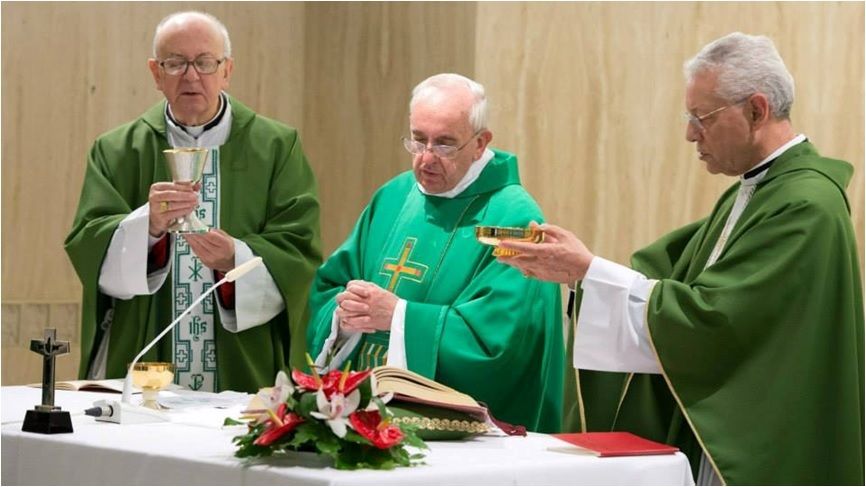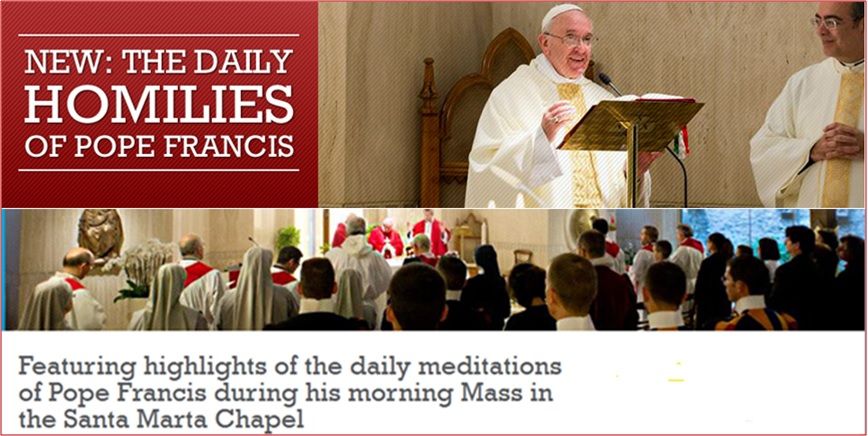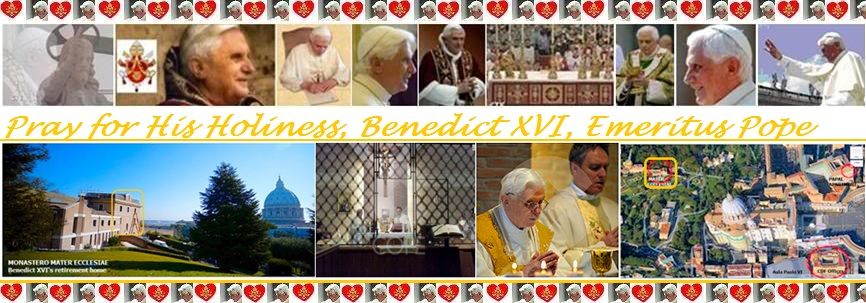 Is this the Per Ipsum?
Fr. Blake who heads a parish in Brighton, England, is one of two British blogging priests. along with Fr. Tim Finigan, I have followed during Benedict XVI's Pontificate. In all that time, I believe this is the first post of this kind I have seen from him. Sarcasm is not usually his thing...
Pope Francis's 'emancipated' liturgy
Is this the Per Ipsum?
Fr. Blake who heads a parish in Brighton, England, is one of two British blogging priests. along with Fr. Tim Finigan, I have followed during Benedict XVI's Pontificate. In all that time, I believe this is the first post of this kind I have seen from him. Sarcasm is not usually his thing...
Pope Francis's 'emancipated' liturgy

June 19, 2013
Before I go any further, I am a great fan of so much of what our Holy Father has to say, especially about the poor, economics and the environment, at least in its reconstituted Vaticanese form, I am a bit uncomfortable with that cameraman that now has a permanent place on the back of the Popemobile. but it has become pretty obvious that the Supreme Legislator does not consider the rubrics of the liturgy are that important, in fact it seems as if they can be ignored, or changed at will.
Benedict taught the liturgy was "a given", we read the black and did the red. Francis seems to be less precise about these things, his liturgy is "emancipated", as he describes it.
Who cares if priests are vested properly? It is obviously "emancipated" to expect concelebrants to wear chasubles, or to expect street clothes the be covered by an amice if necessary, it is emancipated to put flowers on one corner of an altar and some candles, or are they oil lamps, on the other, with an insignificant crucifix in the middle.
[I take it that since the Santa Marta Masses are supposed to the Pope's daily morning Mass (that he would offer, as his predecessors did, or as any priest should do, regardless of whether there are others present or not), Mons. Guido Marini has - and can have - nothing to do with them, since these are the Pope's private Masses, not official papal liturgies. I wonder who disposes of the arrangements for these Masses, and why it would be a problem at all to just follow the Benedettian altar configuration. Whoever is, he/she/they is or are obviously no fans of Benedict XVI and his respect for liturgy.]
It is emancipated to bow rather than genuflect to the tabernacle and after the elevations. It is unemancipated to prepare a homily carefully. It is unemancipated to expect servers to vest, it is emancipated to have the dressed in work uniforms and it is emancipated to have a Bishop take the role of a Deacon.
I want to be emancipated too. I think I might introduce a few prayers at the beginning of the Ordinary Form Mass whilst the choir are singing the Introit. I've a few different but ancient Offertory prayers I would like to introduce and I feel inclined to genuflect before and after each elevation. Now would that be "emancipated" or just plain Pelagian. or what is the other word, "Restorationist"?
[In fairness, it has been explained that a medical problem - arthritis or sciatica - makes it difficult for Pope Francis to genuflect.]
Obviously my emmancipated choice to celebrate Mass
ad apsidum (towards the apse) is rubrical according to the Missal and a valid option for any priest according to later CDW instructions, so that is not an issue/ Even if the Pope, unlike his two immediate predecessors who chose that option for their daily Mass, chooses not to avail himself of it, but what about "ending", celebrating Mass at he North or South end of the altar, is that emancipated or just plain Protestant?
It is pretty obvious from the Pope's personal liturgical style that any Priest or Bishop can do anything they like in the Ordinary Form, or are there limits?
The photo apparently shows a morning Mass concelebrated daily by the Pope with some senior prelates at Casa Santa Marta, and is taken at the prayer of the 'Per ipsum" ("Through him and in him, etc") that ends the canon of the Consecration - in which instead of the principal celebrant, the Pope, holding the chalice and the host, his concelebrants do. Fr. Blake also notes the 'stripped down' altar table - no candles, small Crucifix, and what he does not point out, a prominent microphone (relative to the Crucifix). A lay blogger has commented on the photo, and goes on to other reflections on the role of Popes in upholding what has been handed down to them:
Speaking of liturgical abuse……
by Lawrence Jones

June 19, 2013
Fr. Ray Blake seems a bit nonplussed over the liturgical behavior of Pope Francis, behavior which is very, very much different from his predecessor... Fr. Blake did have this photo -shown above], which captured one of the more strange “Per Ipsums” I’ve ever seen.
Now, the Mass is a Sacrifice offered by the priest to God. And the Per Ipsum is sort of the conclusion of the critical portion of that Sacrifice, the part where the priest really “finalizes” all that has come before in the Consecration and makes plain for Whom, by Whom, and to Whom the Sacrifice is offered.
But I don’t know that in my 15 years of being a Catholic, and several years of going to Mass before that, if I’ve ever seen the Per Ipsum offered in this manner. Does it undermine the idea of Sacrifice offered by the priest to have the priest who offered It not hold the Precious and Sacred Body and Blood of our Lord at this climactic act?
Fr. Blake noticed some other oddities
[he quotes from Fr. Blake's blog entry]...
Now, many have said “Look, he’s a Jesuit, Jesuits don’t know or care about the finer points of the Liturgy.” I would respond by saying, perhaps that’s why it’s taken 500 years for a Jesuit to become Pope!
But seriously, many Jesuits have offered the Mass fully in line with the rubrics and have shown the proper respect for this, the Source and Summit of our Faith... A more accurate statement might be that liturgical abuse is especially widespread in Latin America, where all manner of abuses and bad ideas have been in wide circulation for decades.
I know many people are not comfortable with even raising questions regarding the actions of the Pope. I’ve been meaning to do a post on ultramontanism, its history, and the destruction it has permitted if not directly caused. But we’ve got to come to an understanding, as Catholics, and it’s something that I’ve only gradually become aware of in the past couple of years, that
there are elements of the Faith that not even the Pope should change radically.
That’s not to say he hasn’t the power to do so, it’s that he hasn’t the right. As Fr. Blake says, one of those things is the Liturgy. Popes, historically, have felt bound by what they received in the Liturgy. They felt what they received was something beyond human, and that it was their duty to protect and defend that which they had received, and not make wholesale changes to it. Such changes as were made, historically, were limited to either permitting gradual, organic growth, or codification/rationalization of various Rites, in the case of Trent (which liturgical reform was not entirely “organic,” either).
That all began to change in the early 20th century, during a period of incredible ultramontanism that raged in the wake of Vatican I, where the dominant opinion really was that the Pope could do absolutely anything he willed, and that anything would be by definition good
That thinking led directly to the mid-20th century liturgical revolution, where a Pope decided it was appropriate not only to scrap close to 2000 years of liturgical tradition, and create a new “ecumenical” liturgy out of whole cloth, but also to, in an unclear manner, declare the traditional Liturgy abrogated
[Paul VI did not, actually, but his promulgation of the Novus Ordo was considered universally to have meant an abrogation of the traditional Mass, until Benedict XVI made the necessary correction in 2007]–
something even the uber-progressive Hegelian Jesuit Karl Rahner defined as constituting a “mortal sin.” Pope Benedict later clarified that it was not right to abrogate a timeless Rite. And thank God for that.
But this ultramontanism goes beyond the Liturgy. The other sacred duty of popes, in addition to guarding, upholding, and cherishing the Liturgy as they received it, is to guard, defend, uphold, and transmit the received Tradition! That is, the complex set of beliefs and practices that have come down to us from the earliest Church.
Such was seen as the most basic function of a Pope for a very, very long time, but sometime in the 20th century that belief, too, became very muddied, very unclear, and we have now had a succession of Popes whose guardianship of Tradition has been at times troubled, at best.
And we have many faithful Catholics today who believe, or who have been led to believe, that Tradition is nothing more than whatever the present reigning Pope defines it to be. I have read such on several high profile Catholic blogs of late. I don’t think it takes much thought to find numerous problems with such a belief.
It’s a very sticky situation. Without belaboring the point too much, let me condense what I’m trying to say down to this:
we need to be, as Catholics, careful not to reduce our definition of “orthodoxy” or “faithfulness” down to “I do or say whatever the Pope does or says.” I don’t think idea meshes well with either the history or Tradition of the Church.
BTW, The site news.va marked the first 100 days of this Pontificate by inaugurating this new feature:

 I know I have been remiss so far in posting any of the articles that have been written about Pope Francis's first 100 days as Pope, but this is not a Pope Francis site, after all, and anyone who is interested would already have read them without my prompting.
I know I have been remiss so far in posting any of the articles that have been written about Pope Francis's first 100 days as Pope, but this is not a Pope Francis site, after all, and anyone who is interested would already have read them without my prompting.
Just to make sure that everything is clear about where I stand: From Day 1 of Pope Francis's Pontificate, it was never my intention to chronicle this Pontificate as I tried to do that of Benedict XVI. After all, this Forum is dedicated to Benedict XVI and continues to be, even if he is no longer Pope.
In the case of Pope Francis, I have limited myself to posting the Vatican bulletins about his daily activities and providing links to his major statements and addresses. He is our Pope, and his daily activities and statements provide the current context for the life of the Church.
However, the articles and commentaries on Pope Francis that I choose to post and comment on in this Forum are those that bear on or reflect on Benedict XVI's Pontificate and person - in the continuing desire to have a documented rebuttal to statements that are unfair, untrue, malicious and/or harmful to Benedict XVI. Pope Francis is already universally apotheosized more than amply and vociferously, and even if he were not, he does not need this Forum in any way (any more than Benedict XVI did!). Those of us who followed and continue to follow Benedict XVI with total dedication and love do so out of a personal connection to him - a directed commitment and dedication, not a general commitment to any other Pope.
Pope Francis has my allegiance to him as my Pope and the love that every Catholic has for the Pope, the same love I felt for the Popes in my lifetime, from Pius XII to Paul VI. Such love spontaneously acquired a personal connection with the two John Pauls, and on a different order of magnitude and more so, with Benedict XVI, that's all. I do not feel that with Pope Francis, any more than I felt it with Pius XII, John XXIII, and Paul VI, so the feeling has nothing to with Pope Francis and who he is, with all his great virtues and excellences. It simply has to do with my personal response to him.
But even if I had felt the same spontaneous connection, I would never have felt compelled to commit myself to following this Pontificate the way I did Benedict's, for the simple reason that I do not have the time to do more than I am already doing (increasingly difficult as it is to find not just the time ,but to be as prompt and as regular about it as I would like to be).
The experience of the past three months has shown that practically every news story or commentary published about Pope Francis is tailored to reflect negatively on Benedict XVI and/or his Pontificate, so in this category, obviously, I have had to choose for purposes of rebuttal, only those that are either 'typical' of such reporting and commentary - namely, they reflect the herd mentality in MSM and Catholic media, and the boilerplate line they all tend to take with respect to any particular papal event or statement; and those that appear in major media outlets that take the anti-Benedict line to an offensive extreme.

[Modificato da TERESA BENEDETTA 21/06/2013 16:17]